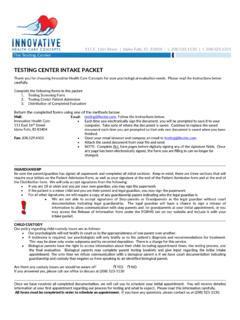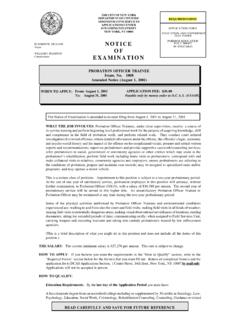Transcription of Steps to Seek and Begin Therapy
1 Anne Marie Nixon PhD, LPC, NCC Welcome! The aim of this packet is to provide you with clear and comprehensive information about the therapeutic process in regard to family, social and individual Therapy , your responsibilities and rights. If you should have any questions please refer to your therapist for help. Please remember to fill out the page marked with stars as well as a release form if needed and return them to your therapist to copy and file. Steps to Seek and Begin Therapy 1. Initial Inquiry or Referral: This may be a phone call in which the parent and therapist will gather initial information such as personal contact information, description of primary concern current/past treatment history.
2 At this time assessment or initial intake appointment is typically scheduled. 2. Initial Observation, Assessment and Intake: This will be a session in which the therapist will speak with client or child caregivers if the client is a minor, observe and interact with the client and use any screening or assessment tools to gather data for interpretation and use in treatment planning. 3. Service Provision: Counseling services are provided using family systems, client- centered and CBT strategies. Parents or caregivers are an important part of Therapy and if the client is a minor, will almost always be participants in sessions with children. Weekly notes/suggestions from the therapist to parents, parent consultations and parenting coaching are all utilized as Therapy progresses. Sessions may include individual counseling, parent/child counseling, parent coaching and consultation.
3 What To Expect During Sessions Sessions with children and families are framed using techniques from developmental, client-centered and play-based models of Therapy . Strategies are altered and chosen to compliment the needs of individual clients and families. Children and parents are encouraged to participate in sessions together to increase the time available for parent coaching and improve carry-over into the home and school environment. Sessions are scheduled as either individual, small group or larger group experiences. Individual sessions can consist of 30, 45 or 60 minute slots. Group participation is generally 60 minutes. 30 and 45 minute slots will include around 5 minutes at the end of the session for caregiver contact and consultation if the caregiver is not already participating in the session. 60 minute sessions will include between 5 and 10 minutes for this contact.
4 At this time, the session can be discussed and suggestions can be made for home carry-over. In addition, this is a time to ask questions of your therapist and prepare for the next session. For confidentiality protection, parents and guardians can not be present in the sensory gym unless circumstances dictate privacy can be kept. Sessions with parents and children together will take place in smaller treatment rooms in which privacy can be guaranteed. Anne Marie Nixon PhD, LPC, NCC **Client Contact Information** Family Name: _____ Child/Client s Name: _____ Client s :_____ Mother s Name /Caregiver 1: _____ Father s Name /Caregiver 2: _____ Address: _____ _____ Home Phone Number:_____ Caregiver 1 Mobile Number:_____ Caregiver 1 Work Number:_____ Caregiver 2 Mobile Number:_____ Caregiver 2 Work Number:_____ Applicable E-Mail Address(es):_____ The best way to contact me/us is:_____ By signing this form I affirm that the information I have recorded is true as I know it.
5 In the case of minor clients, I affirm that I am the legal guardian of the minor client and have legal rights to pursue Therapy for this child. Signed:_____ Date:_____ Anne Marie Nixon PhD, LPC, NCC Confidentiality and Client Rights Information It is your right to have an ongoing dialogue with your therapist regarding your rights, disclosure of information, confidentiality and any other concerns. Your therapist will not share your information with outside parties without your consent or without sound legal or ethical reason (noted below). Confidentiality may only be breached when it is necessary to do so in order to protect the safety or health of an identified person(s) or when ordered by a court of law.
6 Your therapist will do his/her best to inform you if confidentiality needs be breached for one of the above mentioned or any other reason. Information shared within a practice, with employees or supervisors will be kept minimal, respectful and strictly confidential. When working with groups, your therapist will explain the importance of respecting the confidentiality rights of all group members. Clients in group settings will be reminded that the level of confidentiality is different when compared to individual sessions and that others information must not be repeated or shared. When couples or families are involved in Therapy , it will be clearly defined as to whom the client is. Confidentiality and information sharing procedures will be discussed. If a child of a divorced couple with joint custody is participating in Therapy , both parents must consent in writing to any treatment of the child.
7 No treatment can take place without consent of both parents. If a child of a divorced couple in which one parent has sole custody participates in Therapy , information can not be shared with the parent that does not have custody of the child without permission of the custodial parent. Only caregivers that have custody or shared custody of a child may initiate or participate in Therapy . If a family is engaged in a custody battle or needs Therapy or assistance around custody issues, KidTherapy will refer the family to a clinician that is experienced in the area of divorce/ family Therapy . When a client is incapable of giving consent to share information or is a minor, the therapist is guided by ethical and legal standards of practice to protect his or her personal information. This means that minors have rights to privacy and to share information with therapists knowing these rights will be protected.
8 Exceptions are when clients pose a danger to themselves or others or if the identified client is a parent. When working with children and parents, therapists will maintain trust and confidentiality of even young clients while acknowledging the caregiver/legal guardian s role and right to information. Often the parent or caregiver is considered the client or the family as a whole is considered the client so that information can be shared when needed and appropriate. Therapists will practice within their scope of competency and expertise. If a therapist can no longer be beneficial to a client or is not the best fit for particular type of client or client need, an appropriate referral will be made. It is your right to question and require explanation from your therapist regarding practice, treatment, payment, theoretical orientation, ethical standards and other topics.
9 It is your right to review records in your personal file regarding treatment, referrals and general therapeutic progress. Anne Marie Nixon PhD, LPC, NCC Duty To Warn Duty to warn is the obligation a mental health professional has both to her client as well as others to warn if an individual makes threats, is going to or could likely cause harm to another person or his or herself. This applies to talk of suicide during which a therapist believes a client may carry out or plan to carry out a suicide attempt. New Jersey law requires professionals practicing privately to be licensed or otherwise credentialed and to respect and follow the ethical and practice guidelines put forth by the American Psychological Association.
10 It is a therapist s obligation to keep personal and private information confidential and to value the working relationship between a professional and his or her client. However in a situation in which there is potential for someone to be hurt, it is ethically appropriate to breech confidentiality and share crucial information. American Counseling Association Section Serious and Foreseeable Harm and Legal Requirements The general requirement that counselors keep information confidential does not apply when disclosure is required to protect clients or identified others from serious and foreseeable harm or when legal requirements demand that confidential information must be revealed. Counselors consult with other professionals when in doubt as to the validity of an exception. Additional considerations apply when addressing end-of-life issues. If a Client or Another is in a Dangerous Situation: 1.



